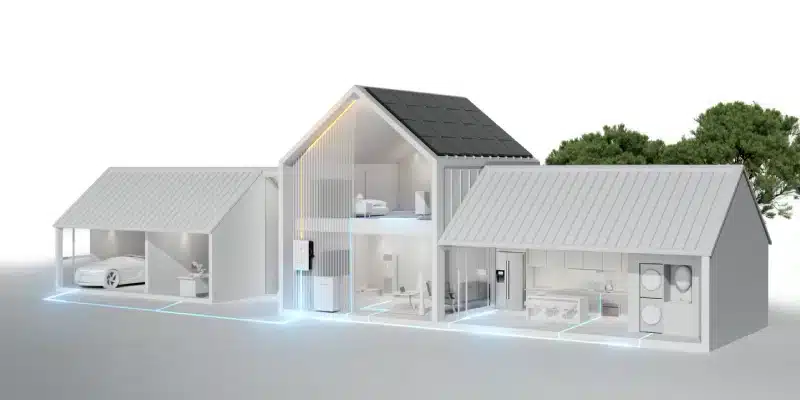
Before you start picking out solar panels like a kid in a candy store, let’s chat about the unsung hero of any off grid solar setup: solar backup batteries. Batteries are like the heartbeat of your solar ecosystem. Without them, all that sweet sun juice you’re generating will have nowhere to go when the sun sets.
So let’s deep-dive into the world of solar backup batteries.
Table of contents
Lead Acid Batteries
How They Work
Lead acid batteries are the granddads of the battery world, tried and true. They use a combination of lead plates and an electrolyte solution of sulfuric acid to store electricity. When charged, ions move between the plates, creating an electrical current.
Cost vs Capacity
Generally speaking, lead acid batteries are the cheapest upfront. However, they have a lower lifespan and are less efficient, meaning you’ll likely spend more over time. They offer a capacity range between 20-200Ah (Ampere-hours).
Should You Get One?
Lead acid batteries are great for small, budget setups but require regular maintenance, like topping off the liquid and checking acid levels.
Lithium-Ion Batteries
How They Work
Lithium-ion batteries are the cool kids on the block. They use lithium ions that move between the anode and cathode within the battery, allowing for high energy density.
Cost vs Capacity
They’re pricier upfront but offer a higher lifespan and better efficiency. A single unit can range from 100-300Ah.
Should You Get One?
If you can afford the initial cost, lithium-ion is a stellar choice for medium to large setups.
LiFePO4 (Lithium Iron Phosphate)
How They Work
A subset of lithium-ion, LiFePO4 batteries use lithium iron phosphate as the cathode, offering higher thermal stability and safety.
Cost vs Capacity
While still in the lithium price range, these guys can be a bit more expensive due to their specialized nature. They offer capacities ranging between 100-200Ah.
Should You Get One?
Ideal for those wanting the benefits of lithium-ion but with an added layer of safety.
Flow Batteries
How They Work
Flow batteries use two chemical components dissolved in liquids, separated by a membrane, to produce an electric charge. They’re fully scalable, meaning you can easily expand your storage.
Cost vs Capacity
These are on the higher end of the price spectrum but offer large-scale solutions. Capacity ranges are practically limitless, making them ideal for large setups.
Should You Get One?
If you have a large-scale operation and the budget to match, flow batteries are a fantastic long-term solution.
Saltwater Batteries
How They Work
Saltwater batteries use saltwater electrolytes to store electrical charge. They’re a greener option, using non-toxic, abundant materials.
Cost vs Capacity
Moderately priced and offer capacities ranging from 20-100Ah.
Should You Get One?
Perfect for those looking for an eco-friendly solution that sits between lead acid and lithium in terms of cost and capacity.
Solid-State Batteries
How They Work
In these batteries, the usually liquid electrolytes are replaced by a solid-state material. This enhances safety and energy density.
Cost vs Capacity
Being the latest technology, these are the priciest of the lot. However, they offer incredible capacities of up to 500Ah in some cases.
Should You Get One?
If you’re looking for the most advanced, safest, and highest-capacity option, and money is no object, then solid-state is the way to go.
Calculations and Conversions
Understanding how to convert battery capacity in ampere-hours (Ah) to kilowatt-hours (kWh) can be really useful when you’re trying to figure out how much energy you can actually use from your solar backup batteries. Let’s break it down:
What is Ah (Ampere-Hours)?
Ah stands for Ampere-Hours, and it represents the charge storage capacity of the battery. Essentially, it tells you how many amps the battery can provide for a period of one hour.
What is kWh (Kilowatt-Hours)?
Kilowatt-hours (kWh) is a unit of energy that is commonly used for billing by power companies and refers to the amount of energy used. One kilowatt-hour means you have used 1 kilowatt (or 1000 watts) for 1 hour.
The Conversion
To convert Ah to kWh, you need to know the nominal voltage (V) of the battery. The formula is:
kWh = Ah × V ÷ 1000
Here’s why the division by 1000 is needed: Ah gives you the battery’s storage in ampere-hours, and voltage is in volts. Multiply them together, and you get watt-hours (Wh). Since 1 kWh is equal to 1000 Wh, you divide by 1000 to get the value in kWh.
An Example
Let’s say you have a 12V battery with a capacity of 100Ah. Plugging these numbers into the formula, we get:
kWh = 100 × 12 ÷ 1000 = 1.2kWh
So, a 12V battery with 100Ah of capacity can store 1.2 kilowatt-hours of electricity.
Interested in learning more? Check out our reviews: Home Battery Backup
We hope you enjoyed this guide to solar batteries!
